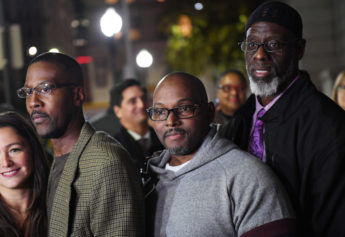
Anthony Graves spent 18 years in jail, 16 of them on death row, for a crime he didn’t commit. Prosecutor Charles Sebesta obtained a conviction despite a lack of physical evidence. (Getty Images)
The Texas State Bar has stripped a former district attorney of his law license for sending an innocent Black man to death row.
The Guardian reported the action was taken by the Texas State Bar’s disciplinary committee against Charles Sebesta. Sebesta had overseen a case that had convicted Anthony Graves on false charges. Graves was falsely accused of being an accomplice in a Houston fire that killed a grandmother and five children. He was eventually imprisoned for 18 years, spending 12 of them on death row.
However, there was no physical evidence linking him to the crime. The Guardian said Graves’ conviction was reversed in 2006 and he won a retrial. The U.S. Fifth Court of Appeals overturned the conviction in 2010 and found no credible evidence linking Graves to the case. The state of Texas eventually paid Graves $1.4 million in compensation for his wrongful conviction.
The court also found Sebesta engaged in multiple incidents of prosecutorial misconduct. Sebesta pressured Robert Carter, another man convicted of setting the fire, to say that Graves was involved. He also failed to reveal to the defense that Carter confessed he had acted alone. Sebesta also committed perjury when he lied about one of the defense witnesses. Sebesta said the witness was a murder suspect and threatened him with prosecution. The witness later refused to testify.
Essentially, Sebesta sat on evidence that could have freed Graves, and almost sent an innocent man to his death. An Atlanta Blackstar story said that this kind of prosecutorial misconduct happens frequently in the criminal justice system.
The National Registry of Exonerations’ 2015 report found a record 125 people were exonerated last year. The report revealed official misconduct in 75 percent of homicide exonerations and 40 percent of all exonerations, according to The Atlanta Blackstar.
Graves, who filed a complaint against Sebesta 20 years after his conviction, said he felt vindicated by the Texas State Bar’s decision.
“The bar stepped in to say that’s not the way our criminal justice system should work,” he said in an interview with The Dallas Morning News. “This is a good day for justice.”
Sebesta is still unrepentant. He told Reuters he believed Graves was rightfully convicted.
“My opinion is that we presented the evidence we had and felt like it was sufficient,” Sebesta said.
Sebesta has to give up his law license, but several commenters on The Guardian’s website felt he should have done jail time for almost killing an innocent man. Graves’ exoneration raises a disturbing question. How many innocent people did Sebesta send to their deaths?
A 2014 research study published in The Proceedings of the National Academy Of Sciences found that 4 percent of people sentenced to death were innocent.
“This is a disturbing finding,” said Samuel Gross, a law professor at the University of Michigan law school and lead author of the research, in a Guardian interview. “There are a large number of people who are sentenced to death, and despite our best efforts some of them have undoubtedly been executed.”


